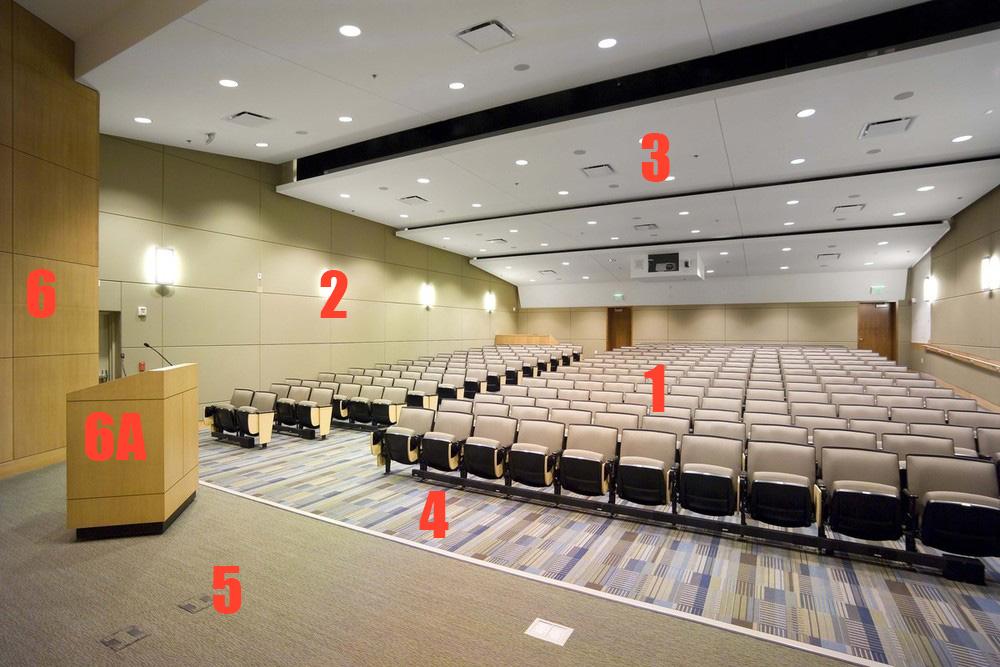It is important to note that indoor air quality is a critical factor to consider when it comes to selecting materials used within the room. The case is concerned with an auditorium at a local university, which requires proper materials and furnishes for six main elements. These include
- seating upholstery,
- textile for acoustic wall panels in the seating area,
- ceiling paint,
- carpeting for the auditorium,
- carpeting for the stage, and
- wood finishes for lectern and wall paneling on stage as shown in Figure 1 below.
The primary concern for the client is indoor air quality, which is why the selection of materials and furnishes with their manufacturers are chosen correspondingly.
In order to properly understand the underlying priority in deciding what options to select for these six items, it is useful to define what constitutes indoor air quality or IAQ. The latter refers to the air quality within and around buildings and structures, especially as it relates to the health and comfort of building occupants’ (EPA part. 1). It carries immediate and long-term health hazard effects, which provides a solid basis behind the client’s requests. Firstly, for the seating upholstery, plush or recycled cotton from Crypton Fabric manufacturer is the best choice since it “is low-emitting and GREENGUARD Gold Certified ” (LDF par. 8).
It is cost-efficient, durable, stain-resistant, and easy to clean as well. Secondly, when it comes to textile for acoustic wall panels in the seating area, vertisol made by Vertisol Acoustics is recommended because it does not emit volatile organic compounds (VOCs) (Miralles par. 5). Thirdly, in the case of the ceiling paint, Biora Air paint made by Teknos is selected since it “absorb and neutralizes aldehyde pollutants,” and it does not release VOCs (Dezeen par. 2).
Fourthly, for the carpeting for the auditorium and the stage, Bio-Floor carpets by Earth Weave Carpet Mills made from untreated wood should be the choice of interest because it is non-toxic and does not contain any VOCs (Johnson par. 9). Lastly, Pure Glue Eco Plywood wood panels from Hanson uses eco-friendly wood combined with “a non-toxic, formaldehyde-free glue for improved air quality” (Hanson Plywood Limited par. 1). It has California Air Resources Board’s No Added Formaldehyde (NAF) verification and certification (Hanson Plywood Limited par. 3). All of these selections with their manufacturers not only offer superior indoor air quality solutions, but equivalent or even better durability and aesthetics.

All of the described manufacturers and their products have The Gold Standard certification for Indoor Air Quality, as shown in Figure 2 below. The client’s primary concern was indoor air quality, which is why the materials and furnishes with minimal contribution to indoor air pollution were selected. For example, the wood itself is not harmful, but the glue and surface coating is, which is why NAF certification is critical. Textiles and carpets can release VOCs due to dyes and treatment, and thus, untreated products or products with no VOC precursors are chosen with a similar logic being applied to the ceiling paint.
In conclusion, the core concern for the client is indoor air quality, which is why the selection of materials and furnishings with their manufacturers are chosen correspondingly. The items of interest include seating upholstery, textile for acoustic wall panels in the seating area, ceiling paint, carpeting for the auditorium, carpeting for the stage, and wood finishes for the lectern and wall paneling on stage. It is critical to note that indoor air quality is an important factor to consider when it comes to selecting materials used within the room.

Works Cited
American Wood Council. National Design Specifications. ANSI, 2018.
Dezeen. “Teknos Interior Paints Provide ‘Better Indoor Air Quality.’” Vertisol, 2022. Web.
EPA. “Introduction to Indoor Air Quality.” United States Environmental Protection Agency, 2021. Web.
Hanson Plywood Limited. “Pure Glue Eco Poplar Throughout Plywood.” Earth911, 2022. Web.
Johnson, Chrystal. “Roll Out Toxins: How to Choose Carpet That Will Keep Indoor Air Pure.” Earth911, 2022. Web.
LDF. “Which Upholstery Fabric is the Most Durable?” Living Designs Furniture, 2022. Web.
Miralles, Marta. “Acoustic Panels for a Healthy Architecture.” Vertisol, 2020. Web.